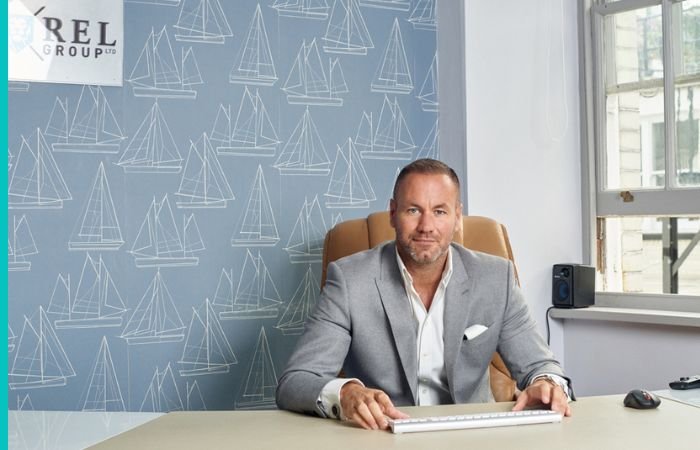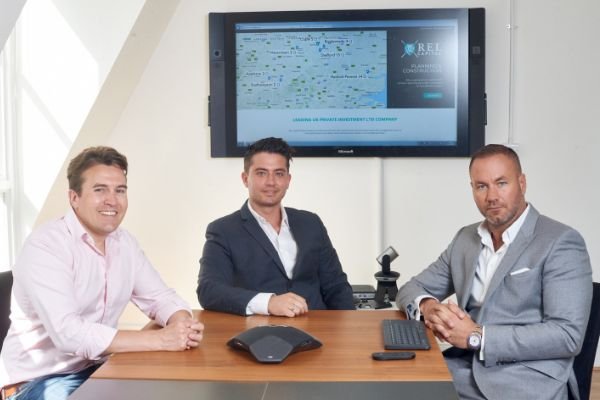Meet Andy Scott, founder of REL Capital
Andy Scott, founder of REL Capital is the epitome of being born with entrepreneurial talent and confidence to seal a deal due to many years of investing and owning businesses across multiple sectors.
I would love to take this opportunity to roll things back a little and find out more about your journey. So, you’ve been coined ‘from doorman to deal maker’ how did it all begin?
I began working on the door of clubs from an early age, and I always loved tinkering and doing things up and growing up near the water I was doing an old boat up, so I was earning extra money while working on the door. I continued doing when I started University and quickly realised that University wasn’t for me.
While working on the door one of the guys had an old house that was up for sale, and around the same time I had inherited some money from my Grandmother, allowing me to do a deal with him. I bought the house, did it up, doubled my money and I was kind of off from there.
I then bought a couple of bigger houses, got into guest housing and was lucky enough to have that financial boom in through my 20s, so property prices were going up, and I think that’s the big difference between then and today’s generation; they don’t have that. So, it was just a matter of trading up and up, because early on I had three guest houses, while still working the door every night until around 3 am, cooking breakfast at 6 am, then working on building sites during the day, so it was really hard graft, but I enjoyed it.
Why property? Or was it just a complete coincidence that it became the route for you?
Well, yes, I think it was just a coincidence. I’d always worked from an early age, my Mother had a sweet shop, so I would work there, and I was quite entrepreneurial. If we didn’t sell all of the sweets, I’d be off to the market to sell them the next day. So, it was natural for me to work hard and look out for the next opportunity.
How did you take all you have learnt as a young entrepreneur, to a property developer, to owning your own investment company?
From the age of 22, I received permission to turn the guest houses into flats and with that being the primary source of income of all the businesses, I had to make a good choice. I later traded up to bigger hotels and then realised, there’s money to be made not turning them into flats, plus I enjoyed running the hotels. It was an excellent feeling when you get a team of people working together, so much that they become like family, so that was nice.
I believe at the age of 23 I bought my first million-pound hotel in Bournemouth on the South Coast and later got funding to buy two more and that freed me up to do a lot of deals buying and selling properties. So, I learnt from an early age to work on the business rather than working in the business and always knowing my strengths and weaknesses, along with having a good management team around me. I do think a lot of people learn that later on in life, but you can’t do that if you're going to grow, you have to let good people thrive as well.
Regarding your investment choices, what do you look out for in the businesses that you decide to invest in?
Well, my main sector is property and leisure, because I’ve had hotels, a group of bars and clubs, so most of my investments are in that sector. We’ve just bought an entertainment business, which we’ve doubled the turn-over on, they’re called Contraband Events, and we’re quite lucky because we have a head office at Oxford Circus with around 50 members of staff, which is helpful to have everyone under one roof. Having a great team has allowed us to invest in a national haulier in November. We have Amazon and Ikea as clients, so it’s a rapid growth business.
And we have agreed two other haulage firms which will complete shortly, operating two other depots in northeast and north-west, to build our UK depot network. I like the sector. It is an unloved sector, which doesn’t have a lot of young entrepreneurial appeal. Quite possibly because it has issues regarding scaling, due to the highly regulated nature of the business, for instance, each truck I own, I have to keep £5k in the bank, so with 50 trucks, that's £250k just sitting there. Also, people find it hard to retire, as not attractive to the younger generation — so more opportunities here.
We also have a recruitment business, which supplies all the chefs to the top London restaurants, so again on the leisure theme. We’re just getting back into pubs and bars, I’ve bought one recently, Frank Lampard’s old pub in Chelsea and another in pub Reading. I do feel that with the struggle in the high-streets at the moment, it’s a good time to get back into the right pubs.
We’ve grown quite a lot, and I feel as long as you have the right person running things day-to-day who have an invested interest in the business, it’s scalable. It’s when you’re trying to run all these things yourself that’s when you run into problems.
Also, on the topic of investment, I have personally rescued a large classic sailing yacht in Italy from being destroyed last month. There was a dispute in Italy, and ended up taking her for €15,000. She is being refitted and refurbished, but I want lots of people to use her in the summer so I’m offering her for cost price to groups of up to 10 persons in Cannes, St Tropez, Ibiza, Corsica etc. Would be great if young entrepreneurs wanted to use her and to go sailing during the summer.
You have achieved so much in business, which is incredibly inspiring, but what do you think has been the key behind your determination to be successful?
It’s a tricky one indeed. I was reading something recently that people who come from dysfunctional families are usually more driven than those who aren’t – I know this isn’t a counselling session haha, so I don’t want to go into that. But, I do think when you don’t have a stable family unit you're always more driven, I would certainly say that, but then it’s also a love of doing the deal.
I’ve always worked hard – I love it. As soon as I’ve gotten something done, I’m onto the next. So, with success, I don’t see myself as successful, it’s just normal. I’ve been doing it for 20 years, so it’s second nature at this point.
With the financial side of the business being fundamental. Managing such a large company, which continues to grow, how do you keep track of the numbers?
In our head office, we have a Financial Director who oversees the finances, and we have a team of Credit Controllers, Finance Managers, Account Assistants and so forth.
Further, with every MD or partner in the business, they always have a share of the company, because I want them to feel as though it’s their own business, which is paramount. We have great staff and work hard to keep it that way, especially in recruitment where there is high staff turnover, we do very well at retaining good people, and we haven’t lost anyone since last year. We show them total transparency on the numbers. All of the businesses get a weekly sheet on a Friday, and although it’s a bit of an American thing to do, we share and rank people who are making sales. So, everyone sees the sales numbers, allowing them to look at where we are, and they quite like the idea. It makes them feel as though it’s their own business rather than just working for a corporate company and being another number or cog in the wheel.
You’ve been doing this for quite a while now, so you probably have some of the best business stories to tell. What do you think has been the best lesson so far?
The best lesson – oh that’s an interesting one. Looking back, I had an unsettling time in the financial crisis because of the banks. I had about £15 million in loans, and it was indeed an awful time when the banks called in all the loans, and a lot of property developers were struggling.
We don’t mind a market that goes up or down, but everything just came to a full stop, and we couldn’t buy or sell anything, so that was really tough so I guess I learnt from that not to get caught with my trousers down, always have something in reserve and just not to be over geared. I don’t have credit cards anymore; I don’t have any credit, losing £6 million and getting wiped out does that to you, and made me realise that one can be wealthy on paper, but it means nothing.
Someone said to me recently; “if you don’t pay your mortgage for three months, you’re homeless”. It’s very similar to having a business.
A lot of reports have been coming out around failure in entrepreneurship and how it affects our mental health. What are your thoughts on failure in entrepreneurship?
I do quite a lot of deals, but I’ve been lucky the last couple of years because I haven’t had any go wrong. But, I always say as long you are doing around seven or eight out of ten, then you’re doing well. I wouldn't trust anyone who says they have never experienced failure because I think you need to experience failure.
I went through depression, and I don’t mind admitting that, because all I knew was how to work and do deals, so not being able to do that was tough for a couple of years. I do believe it was Churchill that said: “Success is going from one failure to the next with no less enthusiasm”, and I feel having a mindset like that is essential, you have to keep going. Failure is a part of the journey
There is a rise in eco-friendly developments, how do you think property developer scan benefit from this rise?
It can be complex because for property developers to be able to borrow money, we have to get a return, and I think buyers like the idea of having an eco-friendly house, but often they won’t pay more for one.
At the moment a lot of the technology around eco-homes is expensive, so a property developer given a choice will, while considering that often when we borrow money, we have to put our home online, prefer not to build eco-friendly homes. But, I think what we see now, which is good, is that the prices of eco-friendly materials are coming down. With Tesla doing roof tiles which provides insulation making it a little easier. There are a lot of things that are now becoming economical for us to build with, which is great.
What advice would you give to startups who are pushing hard to make their business work after experiencing a knock-back?
Passion is the first thing, and if you don’t have a passion for the business you’re in then when you do get those knock-backs, you’re going to struggle to get back up. If you love what you do, you enjoy it, believe in it, then that should see you through. You need perseverance, thick skin and the will to never give up.
But, I guess if you are in the wrong game and you are flogging a dead horse, there is a point where you have to call it a day and turn your focus to something new. It’s finding that balance – it can be tough sometimes.
With Brexit and everything being up in the air, how do you think it will affect the property and construction industry?
We own a sizeable regional construction recruitment company, and we have noticed that it is harder to get good staff over the last few months because a lot of people are worried. On the other hand, I know a lot of people are advocating for apprenticeships to get young people into the construction trade. I am a firm believer that there shouldn’t be targets for people going to university, there should be a variety of options opened and available to everyone. Apprenticeships will certainly alleviate the pressure people are feeling.
Going back to your question around Brexit; my personal view is that it will all be a storm in a teacup and it will be Brexit in name only, and very little will change. Saying that a lot of people are worried.
There are a lot of stressed-out businesses, and I can understand why, as on my house building side of things, it's not so good because people are delaying big-ticket purchases and of course a house is the biggest ticket one would delay. We’ve noticed the transactions are down, especially for homes above a million pounds, it’s a real struggle.
How do you think your industry will develop over the next five years?
I think there will be synergies with everything I do. I’m lucky enough to be across five or six different markets, so I guess as long as we evolve and remain current in each industry we’ll be fine.
We made a great move to have everything in-house, so we have someone who works on SEO, two developers, content writers and so on. We recognised that no matter what industry you're in if you’re coming top on Google, (with SEO being a dark art) I think many businesses will do well and that’s something we keep a close eye on.
Do you think tech will have a lot to do with how you invest over the coming years?
I’m a little bit old fashioned and traditional, so a lot of the industries that I’m in are quite traditional. Though I do get a lot of people coming forward with investment pitches, honestly, it’s like buying a lottery ticket. I believe someone said that around 0.04% of these things go well and to me, it’s all entirely alien. For instance, I will buy businesses that make £100,000, and I’ll pay £300,000 because it’s simple, I buy two- or three-times earnings. So, tech isn’t my world, but I have good friends who are disruptors, and that’s amazing to me.
I’m a deal maker and just like doing deals, so , I admire those who invest in tech, because they have to have such tenacity and I know a lot of your readers are probably more tech and startups, but for me, the tech space is too risky. I do think tech is the ultimate risk and I admire those men and women who are leading the way and innovating in that space.










